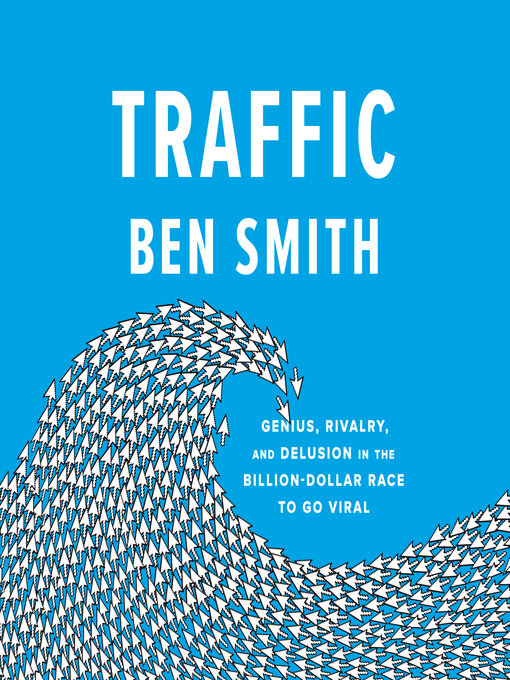Traffic
Genius, Rivalry, and Delusion in the Billion-Dollar Race to Go Viral
“Expertly pulls readers in.” —The Guardian
“Smith sharply chronicles the revolutionary moment.” — Financial Times
The origin story of the post-truth age: the candid inside tale of two online media rivals, Nick Denton of Gawker Media and Jonah Peretti of HuffPost and BuzzFeed, whose delirious pursuit of attention at scale helped release the dark forces that would overtake the internet and American society
If attention is the new oil, Traffic is the story of the time between the first gusher and the perceptible impact of climate change. The curtain opens in Soho in the early 2000s, after the first dot-com crash but before Google, Apple, and Facebook exploded, when it seemed that New York City, rather than Silicon Valley, might become tech’s center of gravity. There, Nick Denton’s merry band of nihilists at his growing Gawker empire and Jonah Peretti’s sunnier team at HuffPost and BuzzFeed were building the foundations of viral internet media. Ben Smith, who would go on to earn a controversial reputation as BuzzFeed News’s editor in chief, was there to see it, and he chronicles it all with marvelous lucidity underscored by dark wit.
Traffic explores one of the great ironies of our time: The internet, which was going to help the left remake the world in its image, has become the motive force of right populism. People like Steve Bannon and Andrew Breitbart initially seemed like minor characters in the narrative in which Nick and Jonah were the stars. But today, anyone might wonder if the opposite wasn’t the case. To understand how we got here, Traffic is essential and enthralling reading.
-
Creators
-
Publisher
-
Release date
May 2, 2023 -
Formats
-
OverDrive Listen audiobook
- ISBN: 9780593671054
- File size: 295269 KB
- Duration: 10:15:08
-
-
Languages
- English
-
Reviews
-
Publisher's Weekly
Starred review from January 23, 2023
Smith, former editor-in-chief of BuzzFeed News and New York Times media columnist, debuts with a riveting insider’s look at the history of online news media. He chronicles the rise in the early 2000s of online outlets that measured success by the amount of traffic individual articles generated, starting with Gawker’s decision in 2003 to start selling advertising space. The incentive to publish salacious content to attract clicks eventually led to the site’s shuttering in 2016, however, when wrestler Hulk Hogan won a lawsuit against Gawker for publishing his sex tape. Positing that there was always a darker side to the quest for clicks, Smith details how Andrew Breitbart applied what he learned as a junior partner at the Huffington Post to his extremist right-wing news outlet, Breitbart. Smith is critical of online media’s obsession with breaking news first, and he offers a candid reflection on his decision while at BuzzFeed News to publish the Steele dossier, conceding he should have anticipated it would be republished without the caveats BuzzFeed included. Smith’s rigorous journalism and proximity to his subject imbue this with abounding insight, and the author’s sharp eye for character gives it the feel of a novel. Sobering and captivating, this is an essential take on the 21st-century media landscape. -
Library Journal
June 10, 2024
Tech journalist Smith's debut charts the rise of new media through two of its major players--Nick Denton, founder of Gawker Media, and Jonah Peretti, cofounder of the Huffington Post and founder of BuzzFeed. Founded as a progressive alternative to popular conservative websites, the Huffington Post started as a combination news site and group blog, but thanks to Peretti's savvy use of search-engine optimization, briefly became an online behemoth, although it was soon eclipsed by BuzzFeed, Peretti's side project. Gawker, the flagship blog of Denton's empire, aimed to keep readers refreshing their screens as a means of staying in the know. Denton and his editors didn't shy away from controversy, and this led to a feud with billionaire Peter Thiel that brought Gawker Media to its knees. Smith focuses on the personalities associated with the era, showing how their forward-thinking was both a boon and a detriment. Smith provides an engaging, approachable narration of the introduction and conclusion, but Ian Putnam serves as the primary narrator. Putnam has an evenly paced, matter-of-fact style that fits well with Smith's reporting, handling even the most outlandish tales of excess and self-absorption in a straightforward manner. VERDICT Ideal for internet-culture aficionados as well as listeners interested in insider peeks at dot-com businesses of the recent past.--Nanette Donohue
Copyright 2024 Library Journal, LLC Used with permission.
-
Loading
Why is availability limited?
×Availability can change throughout the month based on the library's budget. You can still place a hold on the title, and your hold will be automatically filled as soon as the title is available again.
The Kindle Book format for this title is not supported on:
×Read-along ebook
×The OverDrive Read format of this ebook has professional narration that plays while you read in your browser. Learn more here.


